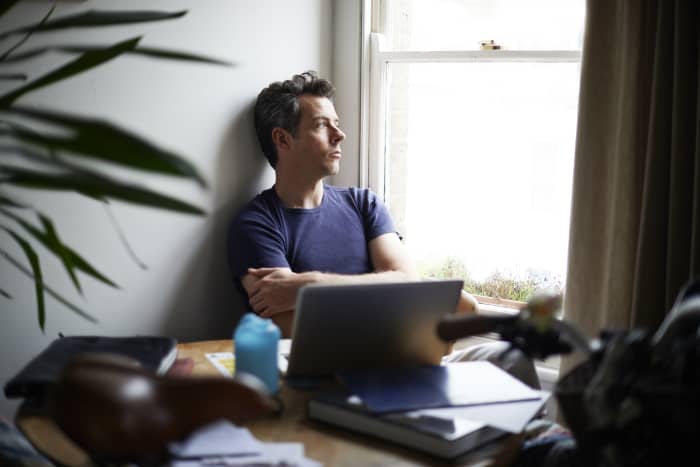Dear Big Move,
I’m a single man in Florida, living at my parents’ house and I want to buy my first home soon to avoid being completely priced out of the market, as prices keep going up.
I’ve found a four-bedroom home for $517,000, and the builder will cover closing costs so I have about $6,000 left in incentives to buy down the rate.
I make about $120,000 a year, and have $180,000 in cash and $290,000 in my investment accounts. I have a car loan which costs me $670 a month.
I’ve already given the builder $1,000 to go under contract on the home, and I am expected to give him $24,000 next week for a total of 5% of the home value. I would put 20% down and take out a 30-year mortgage at a rate of 6.125%.
My monthly payment would be about $3,300, including homeowners association fees, home insurance, mortgage payments, and property taxes.
It seems affordable, but I am still stretching my budget. I’m getting cold feet. If I don’t back out now, I won’t get the money back.
What should I do?
Aspiring homeowner
‘The Big Move’ is a MarketWatch column looking at the ins and outs of real estate, from navigating the search for a new home to applying for a mortgage.
Do you have a question about buying or selling a home? Do you want to know where your next move should be? Email Aarthi Swaminathan at TheBigMove@marketwatch.com.
Dear Aspiring,
Decide if you are buying the house because you want to make that investment, or if you are just feeling the fear of missing out?
With a steady paycheck in the six figures and sufficient funds that you can tap, for not just the down payment on the home, but also towards any other unforeseen expenses — housing-related, or otherwise — your plan to buy this new home seems to make sense on paper.
But if you do the math, you could end up with too much house and a costly mortgage.
If FOMO is dominating your decision-making, stop and think. You don’t want to be left with a case of buyers’ remorse. (You wouldn’t be alone in that. Up to 93% had buyer’s remorse last year, up from 72% the year before, according to this recent survey.)
You say you want to avoid being priced out, but ask yourself if you really need to buy a home right now? Is this home something you’ve planned for months or years because you want your foot on the property ladder, or because you feel like the market is turning and prices are rising?
At 6.125% for your 30-year with 20% down, and assuming a roughly 1.7% tax and insurance rate, you can more reasonably afford a $475,000 home, estimated Hannah Jones, a senior economic analyst at Realtor.com.
This recommendation comes with you keeping your monthly payment at 30% of your income.
To afford the $517,000 more comfortably, you would require an annual salary of $130,000 to remain within the 30% rule of thumb, Jones added. But you’re close.
If you put down 20% on the $517,000, which would be roughly $103,000, that would wipe out a considerable amount from your cash savings, leaving just $73,000 as a buffer for any unexpected housing expenses. These could vary, from home repairs to home-related fees like closing costs and more.
As you make about $120,000 a year, your monthly $3,300 housing payment would eat up about 40% of it. Factoring in your car payment, that would leave you with only half your paycheck left over.
You have to decide if that is enough for your other expenses. Do you have to financially support your parents, whose home you have been living in?
Home-insurance premiums
Additionally, think about how home-insurance premiums rise over the period that you own the home. Home insurance prices went up 21% between May 2022 and May 2023, according to Policygenius, an online insurance marketplace. You don’t say where in Florida you’re buying, but your flood insurance premiums may also rise significantly.
Your taxes won’t increase significantly after you buy the house and get your first bill if you get the Homestead Exemption, as the state caps the maximum increase in assessed value of a house at 3%.
You could put half your paycheck towards your debts (house and car), and rent out other bedrooms. But you’d also add a full-time gig as a landlord to your day-to-day duties. Are you emotionally prepared to live with strangers as housemates, if it makes financial sense to do so?
This house will also likely appreciate in value over time, and since the U.S. is still short of two million homes and with millennials continuing to “drive demand in many area” which is pushing home prices up, according to Fannie Mae
FNMA,
Could you put that money into other investment accounts, or high-yield funds, or buy an even cheaper house, to grow your stash even further?
Or are you ready to take the leap and get your foot on the property ladder? Your house will likely appreciate in value over time, and we all need somewhere to live. Plus, you will be finally independent and no longer have to live with your parents.
Nerves at this point are natural. Reading between the lines in your letter, you may regret not buying in five years time if the price of his house is out of reach.
There are no guarantees, but if you are in your 30s now, your wages over the next two decades are very likely to increase.
Some details have been modified to protect the privacy of the writer.
Realtor.com is operated by News Corp
NWS,
By emailing your questions, you agree to having them published anonymously on MarketWatch. By submitting your story to Dow Jones & Company, the publisher of MarketWatch, you understand and agree that we may use your story, or versions of it, in all media and platforms, including via third parties.







